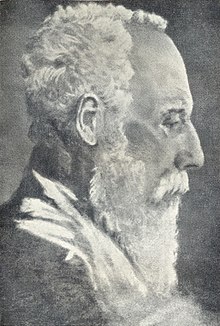Debendranath Tagore
From Wikipedia, the free encyclopedia
| This biographical article needs additional citations for verification. (July 2012) |
| Devendranath Tagore দেবেন্দ্রনাথ ঠাকুর | |
|---|---|
 Portrait of Devendranath Tagore | |
| Born | 15 May 1817 Calcutta, Bengal, Bengal Presidency[1] |
| Died | 19 January 1905 (aged 87) Calcutta, Bengal, British India |
| Nationality | Indian |
| Ethnicity | Bengali Hindu |
| Occupation | Religious reformer |
| Political movement | Bengal Renaissance |
| Religion | Brahmoism |
| Spouse(s) | Sarada Devi |
| Children | Dwijendranath Tagore,Satyendranath Tagore,Hemendranath Tagore,Jyotirindranath Tagore,Rabindranath Tagore, Birendranath Tagore, Somendranath Tagore, Soudamini Tagore, Sukumari Tagore, Saratkumari Tagore,Swarnakumari Tagore and Barnakumari Tagore. |
Devendranath Tagore (Bengali: দেবেন্দ্রনাথ ঠাকুর, Debendronath Ţhakur) (15 May 1817 – 19 January 1905) was a Hindu philosopher and religious reformer, active in the Brahmo Samaj (“Society of Brahmā,” also translated as “Society of God”), which aimed to reform the Hindu religion and way of life. He was one of the founders in 1848 of the Brahmo religion, which today is synonymous with Brahmoism.
Devendranath was a deeply religious man. His movement, the Brahmo Samaj, was formed in 1843 by merging his Tattwabodhini Sabha with the Brahmo Sabha, ten years after the death of Raja Ram Mohan Roy, founder of the Brahmo Sabha. The Brahmo Sabha had fallen away from its original aims and practices,[citation needed] as stated in its Trust deed of Brahmo Sabha. However, Tagore aimed to revive the importance of this deed.
Although Devendranath was deeply spiritual, he managed to continue to maintain his worldly affairs — he did not renounce his material possessions, as some Hindu traditions prescribed, but instead continued to enjoy them in a spirit of detachment. His considerable material property included estates spread over several districts of Bengal; most famously, the Santiniketan estate near Bolpur in the Birbhum district, a later acquisition, where his eldest son Dwijendranath Tagore set up his school.
Devendranath was a master of the Upanishads and played no small role in the education and cultivation of the faculties of his sons.
No comments:
Post a Comment